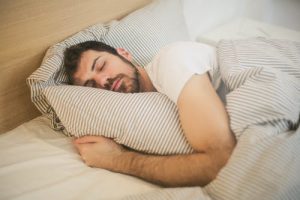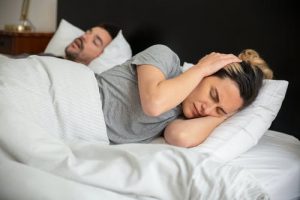For many years, neither scientists nor doctors have paid sufficient attention to the topic of night snoring.
There was an opinion among the people that this is nothing more than a feature of the body, from which others suffer in the first place.
Moreover, “heroic” snoring was mistakenly considered a sign of health. However, studies carried out in this area over the past decades have shown that “night roulades” are often a manifestation of complete cessation of breathing during sleep – the so-called obstructive sleep apnea syndrome.
Table of Contents
Our Research of How To Protect Yourself from Sleeping Apnea
Translated from the Greek “apnea” means “without breathing.” This condition occurs in a dream, either due to overlapping of the airway lumen (loss of tone of the pharyngeal muscles), or due to a violation of the regulation of breathing by the nervous system.
During obstructive apnea, the upper respiratory tract periodically collapses (more often at the level of the pharynx) and respiratory arrest develops with persisting efforts of the respiratory muscles.
While in a healthy person in a dream, the muscles of the pharynx relax to a certain extent, but this does not prevent the passage of air into the lungs.

Today in the USA, about 10% of the population over 30 suffers from respiratory arrest during sleep. Habitual snoring occurs in up to 50% of people over 35.
The risk of falling asleep and not waking up in patients with severe sleep apnea increases by an order of magnitude, not to mention the terrible quality of life.
Each such stop in breathing (and in case of a serious illness, their number can be 500-600 per night) is stress for the entire body.
There is an adrenaline rush, blood pressure rises, pulse quickens, oxygen level in the blood is critically reduced.
Such pauses can last from a few seconds to 3 minutes or longer, and during the whole night a person can “not breathe” for 3-4 hours in total.
At the same time, he himself either does not feel anything – in the case of a mild degree of illness, or is exhausted by frequent awakenings in severe forms, and sleep becomes superficial and ineffective.
Even if in the aggregate the patient “sleeps” for 8 hours, in case of apnea he still usually does not get enough sleep.
As a result, during the day he suffers from headaches, irritability, mood swings, loss of memory and attention.
Often, sleep apnea patients fall asleep in the most sleep-poor conditions, worst of all when it happens in the workplace or while driving, with not only financial but also disastrous consequences.
It was found that women suffer from this disease several times less often than men, and the main risk factor is obesity.
Obesity is perhaps the main risk factor for sleep apnea. Note that in 55% of patients with removable airway obstruction, this obstruction is due to fat deposition at the level of the lateral pharyngeal walls.
There is no such operation for the issue above other than weight loss. This person just needs to lose weight.
Healthy Sleep Rules To Avoid Apnea
- Go to bed and wake up every day at the same time.
- Do not go to bed on an empty stomach, but also do not overeat in advance of the night. The last meal should take place 2-3 hours before bedtime.
It is undesirable to consume large quantities of indigestible foods such as red meat, spicy salty and smoked foods. - Before going to bed, you need to not only brush your teeth and wash your face, but also rinse your nose so that nothing interferes with nasal breathing.
- A few hours before going to bed, it is necessary to reduce the noise level in the room, minimize lighting, and it is also advisable to close the blinds and curtains (the sleep hormone melatonin is synthesized when the light is reduced).
- You can not sleep indoors when the TV or computer is on: for proper sleep, all irritants must be excluded.
- Try to get at least 7 hours of sleep.
- Eliminate alcohol before bed – take a walk and get some fresh air.
- Choose the right sleeping position
The position in which you sleep greatly affects the quality of your sleep. Scientists recommend falling asleep on your side or lying on your stomach.
This normalizes breathing, the body prepares for good rest, and you will avoid unpleasant puffing and snoring. - Drink Magnesium
Another factor affecting our sleep is magnesium. Its lack leads to sleep disorders. That is why it is recommended to eat foods rich in magnesium.

Go to the Doctor If …
The apnea patient himself is often unable to understand that his breathing stops during sleep.
Therefore, close people become the first witnesses of this syndrome. Let’s list the most common signs that signal the need to see a doctor.
• Your loved one or family member makes loud or intermittent snoring.
• From time to time in a dream you observe his breathing stops, which end in loud snoring, turning in bed, movements of arms and legs.
• A snoring person is overweight with “morning” arterial hypertension.
• You or a loved one have severe daytime sleepiness.
Sleep Apnea does not have to show all of the above symptoms. Just snoring or just obesity is enough!
This is the insidiousness of Sleeping Apnea. People mistakenly believe that poor sleep is associated with nightmares, excess weight with depression, shortness of breath with excess weight, snoring with a difficult day, headache with something else, and this chain closes in ignoring symptoms.
A person usually wouldn’t go to a doctor because he cannot admit the thought that this is all a manifestation of a serious illness.

American doctors even compiled statistics on the problems of breathing disorders during sleep and came to the sad conclusion:
– every second person dies from the consequences of sleep disorders due to the banal ignorance of their diagnosis, as well as a frivolous attitude to the problem of snoring.
How To Protect Yourself from Sleeping Apnea Final Words
Remember, treating sleep-related breathing disorder starts with a sleep diagnosis!
An accurate diagnosis and systemic treatment will not only save you from bad sleep and return you to a normal healthy life, but also prolong your life for many years to come.
After all, Sleeping Apnea and the problem of snoring by themselves are not as scary as what they lead to – cardiovascular diseases and death.
Do not forget, health is, first of all, healthy sleep!

